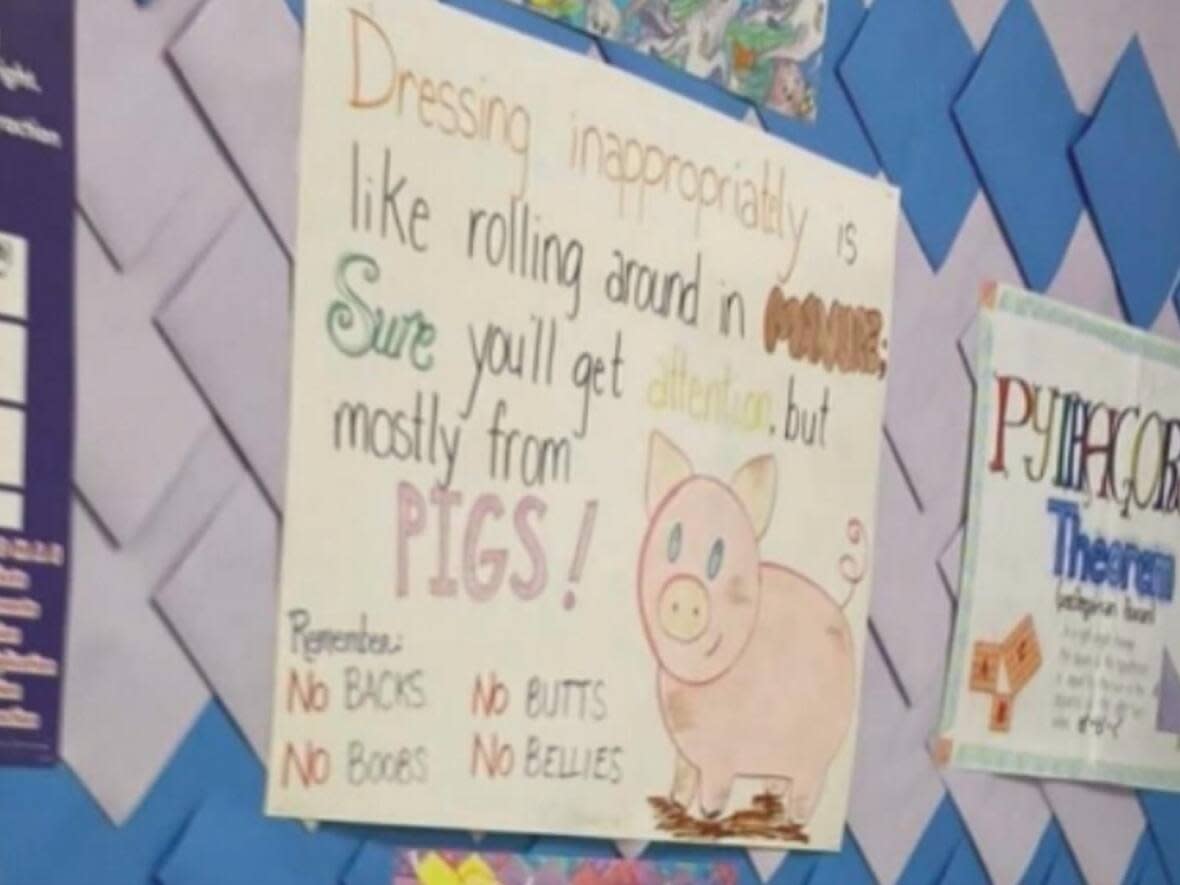LaSalle school removes dress code poster, deemed inappropriate by GECDSB

A poster about enforcing dress codes in a LaSalle secondary school Grade 9 classroom has been taken down.
It was hung in a classroom at Sandwich Secondary School. The poster included a drawing of a pig, and stated "Dressing inappropriately is like rolling around in manure. Sure you'll get attention, but mostly from pigs! Remember: No backs. No butts. No boobs. No bellies."
In a statement, the Greater Essex County District School Board (GECDSB) said the poster was taken down as soon as it was brought to the board's attention.
"The GECDSB is committed to safe, welcoming and inclusive schools that respect the dignity of all students," the statement reads. "We are currently reviewing the board regulation for student dress and creating interim guidelines for school staff to ensure the application of appropriate student dress policies do not adversely affect any students."
Alicia Higgison, chairperson of the GECDSB, called the poster "disturbing", and said she was happy that it had been removed.
"When you see something like that, it is sort of jarring," Higgison said. "I usually put myself in the footsteps of students who who are walking past that and looking at that, and having kind of the same questions that I had."
"'How did this get here and how does it make me feel?'" she said. "I'm grateful to our our administrators who when they were made aware of it, took it down."
Higgison said she is grateful that these kind of discussions are happening.
"These things will be communicated out to our students around not only dress code, but certainly around creating safe spaces for for students with things like dress codes and and with language and and decorum like that, too," she said.
Higgison said currently, there is no board-wide policy, but each school has its own dress code.
"The imagery on it and and the language on it to me was pretty disturbing and not a thing that I would want to see in our schools." - Alicia Higgison, Chairperson, GECDSB
However, work is underway to develop a board-wide dress code, with the GECDSB telling CBC News that a motion to go ahead with the development of a dress code was proposed at the board's May 17 meeting, and further discussion of the matter is expected.
"This will create that kind of equitable environment," she said. "It will also create a very, I'm hoping, a streamlined way to communicate those things, those expectations, those responsibilities for both students and administrators in the system, and for families to know what to expect and on both sides of the coin."
The poster itself, however, was not a good way to communicate with students about how they dress, Higgison said.
"The imagery on it and and the language on it to me was pretty disturbing and not a thing that I would want to see in our schools," she said.
Farrah Khan, a gender justice advocate, said dress codes are often "about policing young women."
"I was on another media show and a caller said, 'well, our dress code doesn't explicitly talk about girls or boys bodies. We just talk about clothing.'"
"But when we're talking about clothing, we're talking about backs and breasts and butts and bellies," Khan said. "We are talking about girls bodies, trans bodies, general binary bodies."
"The policing that happens with men around clothing sometimes is around hair length, or the ways in which hats or colours or clothing in a certain way of bagginess. So we also see the dress codes affect young men, but in a different way," she said.
Khan said dress codes should be abolished.
"I think dress codes oftentimes are built on narratives of race, racism, colonialism," she said, adding there were dress codes in residential schools, as Indigenous children were forced to cut their hair and wear certain clothes.
"They're actually so built on oppression," Khan said. "This idea of policing, shaming and blaming people for creating this narrative of the right way to be, and the wrong way to be. And usually, that's based on cis white male bodies."

 Yahoo Movies
Yahoo Movies 
